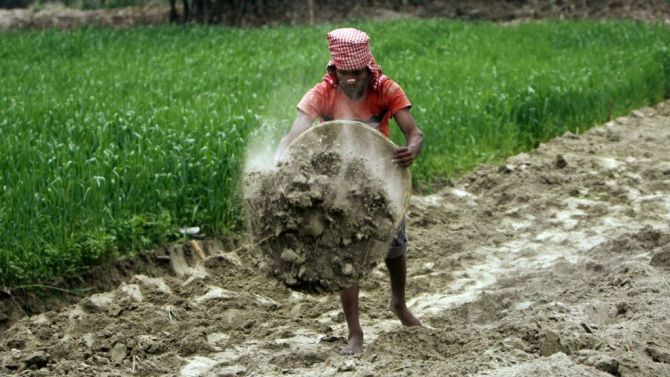In case MGNREGA is expanded, officials said the total expenditure on farming-related works could reach up to 80 per cent of MGNREGA budget, as against the current 67 per cent.

The government’s move to expand MGNREGA for creation of durable assets in post- and pre-harvesting agriculture operations has raised doubts on whether it would lead to using farm labour for big private land at the cost of public exchequer, which could dilute the entire premise on which the Act has been framed.
Senior government officials, however, are confident that there won’t be any move through which MGNREGA ends up subsidising private farm labour.
And, the activities that would be taken up under MGNREGA would be to enhance the construction of post-harvest facilities, such as market yards, village-level and farm gate small processing facilities such as grading and sorting vends, etc.
UP Chief Minister Yogi Adityanath’s suggestion to use MGNREGA labour for building farm fences has also not found much traction among senior officials on the same ground - it might be misused to subsidise farm labour for private lands.
In case MGNREGA is expanded, officials said the total expenditure on farming-related works could reach up to 80 per cent of MGNREGA budget, as against the current 67 per cent.
A number of such activities are already being undertaken under MGNREGA, while the aim in the next phase would be to expand their scope, so as to raise farmers’ income.
Earlier this month, a panel of chief ministers under MP CM Shivraj Singh Chouhan met in the capital to find out ways through which MGNREGA could be used for doing jobs that reduce cost of cultivation for farmers, enhancing the production through efficient use of water or other inputs and even fencing of farms to protect them from wild animals.
The panel also decided to organise five regional workshops in Patna, Bhopal, Hyderabad, Guwahati and New Delhi to discuss with experts, farmers and farmers’ representatives and other stakeholders, along with state governments, the various options through which MGNREGA can be better integrated with farming activities.
The regional meetings will be completed by August 15.
“If at all any activity is permitted on private land, it would be confined to small and marginal farmers, such as those involved in bamboo, papaya, banana plantations, etc, which the Act permits,” a senior government official said.
At present, creation of individual assets under MGNREGA is permitted on land or homestead-owned by households belonging to Scheduled Castes, Scheduled Tribes, nomadic tribes, denotified tribes, other families below poverty line and once all the categories are exhausted then only in the land of small and marginal farmers as defined in the Agriculture Debt Waiver and Debt Relief Scheme of 2008.
Reetika Khera, associate professor, IIM Ahmedabad, told Business Standard that expansion of permissible MGNREGA works should meet two conditions.
First, it should create “additional” employment, rather than subsidising private farm labour.
Second, the new works should remain as labour intensive as possible.
“For example, land levelling raises productivity and is labour intensive. Similarly, wells, orchards and plantations have benefited small and marginal farmers. Construction of threshing floors, which farmers appreciate, can also be considered,” she said.
“There is a lot of creative thinking at the village and district levels. If gram panchayats are allowed to decide (as mandated by the Act), it might be a better way forward,” Khera added.
The Centre is also considering expanding the definition of workers under MGNREGA to include semi-skilled and skilled workers as well, so that more farm-related works could be incorporated in it.
However, which of these get into final nod would depend on the suggestions by chief ministers after their discussion with all stakeholders.
Photograph: Desmond Boylan/Reuters











